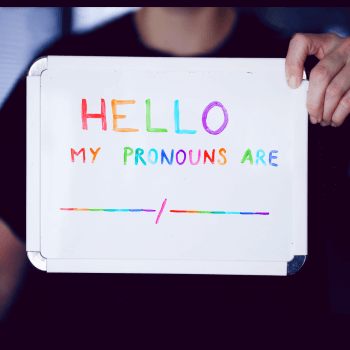Why Pronouns Matter

Here’s what you can do to help people feel valued, seen and respected. Learn why using pronouns and other words is important.
This past weekend, my neighbor reminded me of a word I haven't used before. "Nibling" offers a way to respectfully reference children of your siblings who use gender diverse pronouns like "they/them" or "Ze/Zir". And, for Aunts and Uncles not a part of the gender binary, you can refer to them as your "piblings", a word I had never heard before.
You may think these words are adorable, and so do I, but their importance is far more substantial. Referencing people the way they want to be identified supports them. It allows people to feel valued, seen and respected.
"There's a feeling of affirmation when people use my correct pronoun," explained Julia Tuttle, CHA Patient and Family Advisory Council member and transgender woman. "When people first started using "she" for me, it brought a feeling of joy each time; these days, I simply expect it (although I still get that same sparkle when my twin brother calls me his sister!)."
If you're not sure of someone's pronouns, ask them. It's always better to get the information first hand and follow up by referring to the person using the language they prefer. Language is continually evolving and can be challenging when changes happen quickly. As our language expands, you may hear words you've never heard before.
Titi, zizi, bibi, nini are also options for aunt and uncle, all derived from combining Spanish (tia/tio) or Italian (zia/zio) words. Some people use mashups like auncle [ ahn-kuhl ] or unty/untie. And, while nibling may be the most common for your siblings' children, other words include niephling, neiph/nephiece/niephew, chibling and sibkid.
We use pronouns all the time to refer to people. Most of the time they identify people within a gender binary – two options – female or male. Gender diverse people have expanded the language to reflect those who live outside the gender binary. Here are some of the pronouns used by gender diverse people:
- They/Them/Their
- Ey/Em/Eir (pronounced like they/them/their, but without the th)
- Ze/Hir/Hirs (pronounced zee, here, heres)
- Ze/Zir/Zirs (pronounced like he, here, and here's, but with a z-)
- Xe/Xem/Xiers (pronounced zhee/zhem/zheres)
The only time we use these pronouns is in the singular third person, or when that person is referred to when speaking with another person. For example, my friend uses they/them pronouns – "My colleague, Josie, loves fresh pasta. They went to the North End last weekend with their friends for a delicious dinner."
It can take practice to get it right. Several years ago. I had lunch with a friend who corrected me kindly three times when my mind and mouth didn't connect. I've gotten better but I'm not perfect. When I make a mistake, I apologize and move on. No one wants to deal with too many "I'm so sorry" statements as it starts to feel more about me than getting the pronoun right. I learned making an effort avoids hurting people as misgendering someone is a microaggression. (Microaggression: a subtle behavior - verbal or non-verbal, conscious or unconscious - directed at a member of a marginalized group that has a derogatory, harmful effect.)
"You can be having a perfectly good interaction with someone, feeling connected, and then they misgender you," said Julia. "It's like you hear that record scratch sound effect, everything freezes, and you're disconnected, uncomfortable, and dysphoric."
The consequences of misgendering are real. Continuous disrespect, including misgendering, can be deadly, with about half of the transgender population at risk for suicide.
Respecting people's pronouns is even more important when providing healthcare. "Staff and providers have a lot of inherent power, so trans patients may not feel empowered to speak up. Misgendering trans patients can disengage them from the healthcare system entirely, while asking for pronouns and using them correctly can be a great way to connect."
Let's make the connections.
Sources:
https://www.dictionary.com/e/aunt-uncle-niece-nephew-words/
https://www.mypronouns.org/what-and-why